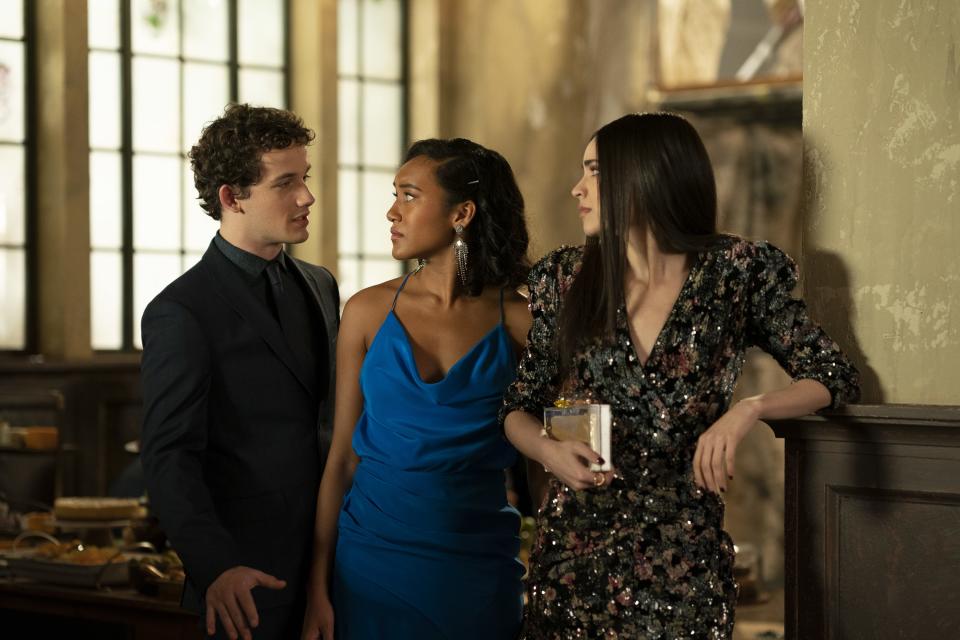"Pretty Little Liars: The Perfectionists" Season One Successfully Smashed the Dollhouse of the Original Series and Empowered Its Leading Women
In this op-ed, writer Gianluca Russo argues that the first season of Pretty Little Liars: The Perfectionists gave its leading women back their power.
Perhaps the most prevalent symbol weaved throughout the original Pretty Little Liars TV series was the dollhouse. Rosewood, for starters, is essentially presented as one giant play set, and Alison, Emily, Aria, Hanna and Spencer are the dolls, moved around at the will of the puppeteer known as “A.” The girls exist as blank, beautiful slates to be projected upon, removed from power in their own stories, even as they grow up and ostensibly try to leave Rosewood and all its horrors behind.
Freeform’s newest spinoff, PLL: The Perfectionists, has officially aired its first 10 episodes, and across that first arc, it’s become clear that the show isn’t interested in presenting its central characters, especially its female ones, as dolls to be played with. The Perfectionists buries that trope — probably in the DiLaurentis’ backyard, where everything goes to die — and instead, gives its main characters the agency to have powerful stories and strong personalities that cannot be controlled by others trying to tear them apart.
PLL: The Perfectionists takes place some years after PLL, with Alison DiLaurentis (Sasha Pieterse) moving away from Rosewood (and divorcing Emily Fields) to follow a new job at the prestigious Beacon Heights University. Upon arrival, she’s shocked to learn Mona Vanderwaal (Janel Parrish) is also in Beacon Heights working at the college; two of the characters from the original series are back together.

JANEL PARRISH, SOFIA CARSON, SYDNEY PARK
Freeform/Allyson RiggsThe other main characters are students at Beacon Heights, and they feel somewhat inspired by their PLL forerunners. Caitlin Park-Lewis (Sydney Park), for instance, holds many of the same values as Spencer Hastings did: Both are determined, political and driven to accomplish great things. Ava Jalali (Sofia Carson), on the other hand, reminds many of Hanna Marin, partially for her fashion interest and partially for her story of navigating her parents’ divorce that followed Hanna largely through the first season of Pretty Little Liars. It’s a little more difficult to pinpoint who Dylan Walker (Eli Brown) resembles, though many could argue he is the new version of Emily Fields: Dylan’s devotion to cello reminds some of Emily’s love of swimming. And then, of course, there’s Nolan Hotchkiss (Chris Mason), whose wealth, family name, arrogance and entitlement feel very much like the O.G. Alison.
The new batch of characters are just as intricate and complex as in the original, with a dynamic friendship to match. But crucially, Caitlin, Ava, and Dylan aren’t just dolls being micromanaged by a manipulative gamemaker, a difference that feels particularly marked for how the show depicts women characters
Pretty Little Liars was grounded in treating teenage girls like dolls, figuratively and literally. In the beginning, Mona treated the five liars — Alison, Emily, Aria, Hanna and Spencer — like her puppets, controlling them with threats that urged them to follow her commands. Even when Mona was outed as being A, it didn’t stop there. CeCe Drake soon took over as the mysterious villain in all black. Let’s not forget about the literal dollhouse (more like a dungeon) that CeCe trapped the girls in during season five. Through different torture methods, she made them follow her every command, even forcing them to make decisions about the kinds of pain the other girls might receive. The teens eventually broke free, but nothing could rid them of the trauma they’d experienced from the many years of being treated like inanimate objects.
And that’s precisely the problem: Reducing women down to being doll-like reduces their agency completely, making them be viewed as helpless victims in an unhealthy and dangerous situation they can never seem to escape. Dolls, afterall, are inanimate objects that have no capacity to fight for themselves or speak their mind. To view women in this way sets them up to be, inadvertently or not, weak, fragile, and — literally and figuratively — plastic. The original Pretty Little Liars dug into so far into this symbolism, in fact, that it was hard to break out of it. At the start of The Perfectionists, Allison reveals that Emily just couldn’t let go of the past, which is a large part of the reason their relationship didn’t work out.
Despite the original show’s attempts to build strong female friendships, there was no way they could ever break free — even many years later — of the grasp and control “A” had on them. Treating the original liars like dolls not only victimized them, but traumatized them in lasting ways. It was a repulsive thing to witness: While evil male characters like Noel Kahn seem to get away with being terrible, women like Mona and Ali, and even occasionally Spencer or Aria, were made out to be the villains, all because “A” manipulated them into acting that way towards one another.
But the heroines of Pretty Little Liars: The Perfectionists are not so easily manipulated. Ava and Caitlin have a complicated relationship: They aren’t quite friends when the season starts. Nolan only made it appear that way in order for everyone at Beacon Heights to believe he had the perfect posse. In a way, Nolan was the gamemaker at the start of the show, treating his three “friends” like dolls. But Pretty Little Liars: The Perfectionists does away with that quickly, killing him off in the first episode. From there, Ava and Caitlin must see if there’s a true friendship between them.

ELI BROWN, SYDNEY PARK, SOFIA CARSON
Freeform/Allyson RiggsThere clearly is chemistry, as we’ve seen through the show’s first season. But before their friendship can flourish, Caitlin must address the fact that she’s badly hurt Ava, having accidentally outed her family issues to the school before the start of the series takes place. Instead of lying about it, she owns up to it and promises Ava that she will prove that she can trust her. In this situation, Caitlin shows how strong of a woman she is: She’s aware of how damaging her mistake was. But instead of hiding it — chances are it wouldn’t be brought up for a while anyway — she admits her wrongdoing soon into her relationship with Ava, refusing to let anyone hold it against her and knowing that the right thing to do is to be honest. Understandably, Ava is hurt. They fight and scream. They are women who have the agency to express their pain and feelings, and to act in ways that are powerful without abusing that power.
At one point, Nolan’s mom, Claire (Kelly Rutherford), attempts to use Caitlin as a doll to try and dig up dirt on Ava and Dylan. But Caitlin cannot in good conscious do that, telling Claire that she won’t spy for her. Instead of succumbing to telling hurtful lies, Caitlin is written to be a strong, morally-driven woman who won’t let anyone subject her to being treated like a puppet.
There are other great instances of women supporting women throughout the show. Alison steps in to help the three new main characters when they’re being questioned by Dana Booker, head of security at the University who is on a mission to get one of them convicted for Nolan’s murder. Much like the cops on the original Pretty Little Liars, Dana is corrupt and out to get the three leads. Yet through her tricks and attacks, they stay closely bonded to one another, refusing to fall into the traps set for them (unlike some old liars we used to know). In some ways, Dana’s attempt to manipulate the new set of Liars only forges a stronger friendship between them. Alison and Mona, for a change, are supporting one another as well, trying to figure out the complex secrets of Beacon Heights. Each of the characters know they aren’t perfect, that they’re going to make mistakes. But being a good friend also means making the decision to put yourself on the line to help those that would do the same for youm rather than being manipulated by external forces.
Of course, there’s still a murderer out there, and the new “liars” have a crime to solve. But Pretty Little Liars: The Perfectionists is not allowing its characters to be thrown around like dolls.
Instead, it’s giving them — particularly the female cast — storylines that show that the spectrum of human behavior, error, and friendship. The Perfectionists doesn’t box itself into the trauma of the dollhouse; it recognizes that the world is not split into evil powerful women and good powerless women, that everyone has some of both; and that most importantly, women are empowered to make the choice.
Let us slide into your DMs. Sign up for the Teen Vogue daily email.
Want more from Teen Vogue? Check this out: We Need to Talk About Sydney Park's Incredible Suits
Originally Appeared on Teen Vogue

